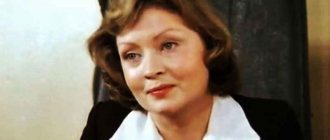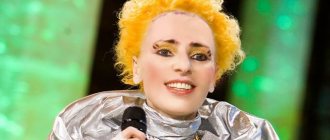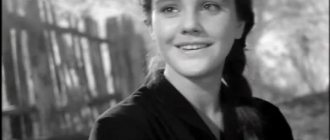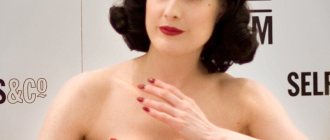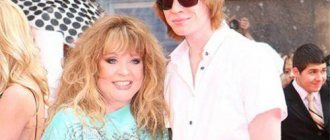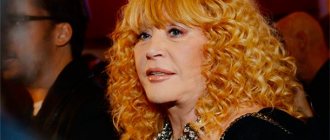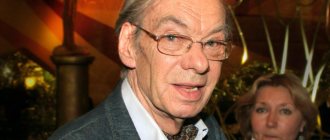Zhanna Bichevskaya is a bard singer who differs from other performers in her very specific repertoire. She prefers spiritual lyrics, romances, and works in an interesting genre - country folklore. Zhanna has never adjusted to others; she has a special approach to choosing songs, lyrics and music. The singer also included patriotic, Russian folklore compositions and works based on poems by classical poets of the early 20th century in her work. She is not afraid to be a “black sheep” and always has her own point of view, which is why few contemporaries know the biography of this bright artist.
Origin and childhood
Where was Zhanna Bichevskaya born? The biography of the singer and her origins are very interesting. The girl was born in Moscow on June 17, 1944 (in the penultimate war year). How did a child of Polish origin end up in Russia? Her father was Vladimir Bichevsky (electrical engineer), her mother was Lydia Kosheleva (talented ballerina). The Bichevsky family descended from Polish nobles and was very ancient. After some ancestral lands came under Russian influence, the Bichevsky family remained here. The singer practically does not remember her foreign relatives. While still very young, Zhanna lost her mother: the woman suffered a lung abscess and died. The father married Elena Bichevskaya, who raised the girl.
Training and education
At first, young Bichevskaya went to a regular Moscow high school. Since childhood, the girl fell in love with playing the guitar, so she went to study music. Since then, the instrument has become her faithful companion. Zhanna never parted with him - in all the photographs the artist can be seen busy playing the guitar. Then Bichevskaya entered the State School of Circus and Variety Arts, where she spent five years. In addition to playing the guitar, the celebrity devoted a lot of time to vocals. Zhanna's teachers were such famous teachers as Elena Petker and chamber singer Irma Yaunzem. It was then that Bichevskaya decided to bring her idea to life - performing a Russian folk song with a guitar. In search of half-forgotten folklore works, the girl traveled around many villages near Moscow.
Childhood and youth
The future star was born on June 17, 1944 in Moscow in the family of ballerina Lydia Gavrilovna Kosheleva and electrical engineer Vladimir Konstantinovich Bichevsky. The father's surname is Polish and has noble roots. Zhanna calls her second mother her stepmother Elena Ilyinichna Bichevskaya, who worked as an accountant.
Zhanna Bichevskaya
In early childhood, the girl dreamed of becoming a ballerina, like her mother. But Zhanna accidentally scalded her leg with boiling water, and she had to give up her career as a dancer. Bichevskaya admits that at one time she wanted to become a surgeon, but realized in time that she was afraid of blood. Clownness is the most unusual profession that the singer dreamed of trying herself in.
Zhanna graduated from the Zagorsk evening music school in guitar class. This subject became the girl's real passion. At the age of 17, she was given her own guitar, Zhanna enthusiastically played tourist and lyrical ballads, songs of unknown authors.
Zhanna Bichevskaya in her youth
From 1966 to 1971, Zhanna studied at the State School of Circus and Variety Arts, where Irma Yaunzem and Elena Petker taught her vocals. The students of her stream were Alla Pugacheva, Gennady Khazanov, Yuri Kuklachev and Elena Kamburova.
While still a student, she begins collecting forgotten folk songs, traveling around Moscow villages, and then recording them. At the same time, Zhanna worked for some time as a teacher at a music school in Zagorsk.
Touring Europe
Further, Zhanna Bichevskaya, whose biography is closely connected with the development of bard song, began to gradually change her style. Folklore notes and fragments of country music were woven into the genre of her performance in a very original way. Thanks to this unusual style, Bichevskaya became a popular Soviet singer. 1973 was a significant year for the artist: she won the All-Russian Pop Song Artists Competition. This allowed the singer to tour the country. Zhanna Bichevskaya's songs became recognizable. Later she was able to tour some European countries. In many parts of the world, recordings performed by Bichevskaya began to be heard. The popular singer performed eight times at the famous Olympique Hall (Paris).
The beginning of creativity
During her student years, Zhanna begins to actively perform in villages with long-forgotten songs. The girl also begins to make her first song recordings. Zhanna Bichevskaya also tries herself as a teacher at a music school. Immediately after graduating from college, Zhanna joined Eddie Rosner's orchestra as a vocal and solo performer. After gaining experience in the orchestra, the girl is invited to perform in the vocal and instrumental ensemble “Good Fellows.” Zhanna agrees without hesitation and sings in the group for two years. After work with the vocal-instrumental ensemble was stopped, Bichevskaya got a job at Mosconcert. In 1973, the girl participated in a pop song artist competition, where she became the absolute winner.
Zhanna Bichevskaya with a guitar
With her growing popularity, Zhanna Bichevskaya begins to travel to various cities and countries. Thanks to her performances, Zhanna visited more than 60 countries, and some several times. Most of all, the singer liked performing in Poland and France. Also, according to the calculations of all the concerts of Zhanna Bichevskaya, the last concerts became sold out. In the mid-1970s, Zhanna Bichevskaya's recordings were sold in large quantities - in more than 35 countries. Zhanna also won the Tenko Prize, which was awarded in San Remo. In addition, Zhanna became a laureate of the Poznanie Prize, which specializes in music competition. Zhanna Bichevskaya decides to re-sing the well-known songs “My dear,” “Am I to blame” and “There was a carriage standing at the church.” Zhanna was not mistaken with these compositions, since it was the performance of these songs that brought even greater popularity to the singer.
Main directions of creativity
Most of all, Zhanna Bichevskaya was attracted to Orthodox culture; she could not come to terms with Bolshevik blasphemy just like Bulat Okudzhava and Vladimir Vysotsky. After democratic forces came to power, the artist was never allowed to fully reveal herself in the direction she had chosen. The theme of the White Guard movement is another motive for her work in the 80s. For her significant contribution to world culture, Bichevskaya was awarded the title “Golden Guitar” - this happened during a song competition in the Italian city of San Remo.
Bulat Okudzhava, Andrei Makarevich, Alexander Vertinsky - these are the authors whose patriotic songs were performed by the singer in the early 2000s. The Orthodox direction and Russian patriotism became the main motives of her albums. Zhanna Bichevskaya's songs convey a love for Russian traditions and a dislike for everything Western. Romance is the favorite genre of the original singer. Here are the most sensational albums of Zhanna Bichevskaya:
- "I believe."
- "White Night".
- "Autumn of a Musician."
- "Tsar Nicholas".
- "In Your Name, O Lord."
- "Russian Calvary".
- “From farewell to farewell” (2014).
Her songs are distinguished by their sincerity and poignancy, which invariably touches even the most callous souls. Particularly popular are such works as: “Boys Draw War”, “Russian March”, “Ringing Bells”, “The Moon Is Turned Crimson”, “A Young Cossack Walks Along the Don”, “Beggar Woman”, “I Had a Dream”. In Bichevskaya’s musical compositions there is a place for sincerity, patriotism, and true faith. They draw society's attention to social problems and also encourage people to value their folklore traditions. Among other things, the singer’s repertoire includes a lot of folk songs, undeservedly forgotten and revived by Zhanna in a new interpretation.
Solo career of Zhanna Bichevskaya
In the seventies, the artist often performed as a solo singer. She played the guitar and sang old Russian songs in the traditional bard style. In her songs one could easily distinguish notes of folk and country styles. Perhaps it was this strange symbiosis that predetermined the popularity of Zhanna Bichevskaya on the Soviet stage. In 1973, she became the winner of the prestigious All-Russian competition of pop artists, and then began to often tour major cities of the USSR.
Some time later, the artist also began to visit the countries of eastern and southern Europe. So, in particular, in the seventies, the singer’s concerts were held in Hungary, Romania, Czechoslovakia, Finland and Yugoslavia. Her albums with recordings of folk songs sold in huge quantities in more than forty countries.
In the eighties, the artist sold out eight (!) times in a row at the famous Prague Olympia Hall. In addition, during this period she became a laureate of a music competition in Poznan, Poland, and also received the prestigious Tenko Prize at the Sanremo Festival.
In the nineties, after the collapse of the Soviet Union, Zhanna Bichevskaya “switched” from folk songs to White Guard romances. However, such a vector in the artist’s work did not last long. Already in the mid-nineties, the basis of the musical repertoire of our today’s heroine was formed by Orthodox and other religious songs. Most of these compositions were written by Hieromonk Roman (Matyushin), as well as her husband, Gennady Ponomarev. The albums “Autumn of a Musician,” “To Your Name, Lord,” and some others were recorded in a similar style.
At the beginning of the 2000s, Zhanna Bichevskaya also began performing songs by famous authors - Alexander Vertinsky, Bulat Okudzhava and some others. During this period, patriotic songs began to dominate in her work. It is not known what caused such changes.
Singer Zhanna Bichevskaya performs patriotic songs
During this period, the work of Zhanna Bichevskaya began to be subject to active criticism. The reason for this was some of the singer’s statements, as well as a video for the song “We are Russians,” in which footage of burning American cities flashed. Because of this, the artist disappeared from the air for a long time, and subsequently practically reduced her touring activities to nothing.
From the beginning of the 2000s until 2008, the former singer worked as a presenter on the Voice of Russia radio, where she hosted the program “From Heart to Heart.”
Personal
Zhanna Bichevskaya's husband is the famous composer Gennady Ponomarev. He wrote many compositions for his wife. Before they met, Gennady sang in a church choir in the city of Tula and was a very God-fearing person. Many fans are interested in the children of Zhanna Bichevskaya. So, the couple has not yet acquired children. Zhanna Bichevskaya's family is very small. The couple have an apartment in Moscow and live in it together.
Curiosities
Supporters of Orthodox views have different attitudes towards Bichevskaya’s work. Some even attribute her to certain sects. The singer’s work is indeed distinguished by prophetic, instructive songs. Some of her concerts are even called sermons. She is not afraid to criticize the patriarch or the president of the country. Zhanna is also very intolerant of everything American and European. Her texts contain rather harsh phrases on this topic. In 2007, a scandal occurred after the release of a video clip for Bichevskaya’s song, in which missiles were launched from Russian planes at American cities.
Zhanna Bichevskaya experienced many searches on her life’s path. Her biography is interesting and unusual. All her life, Zhanna searched for the path to God - this gave her strength and preserved her. Already as an adult, after marriage, Bichevskaya was baptized in an Orthodox church.
The royal family and the personality of Tsar Nicholas were the subject of the singer’s active interest. In one of her discs, Bichevskaya included the famous hymn “God Save the Tsar.” Not everyone liked this repertoire; many criticized the artist.
Zhanna Bichevskaya prefers to avoid participating in parties of modern performers, although even Alla Pugacheva invited her. The celebrity does not trust modern television, has not watched it for 30 years - the woman has her own point of view on any issue. She addresses her songs to people to help them find the way to the Lord. Her compositions help many patients recover from serious illnesses, as they instill faith in the soul. The artist considers the most important steps on the path to God to be getting rid of anger and forgiveness. In 1997, Patriarch Alexei II himself blessed Bichevskaya to release albums with spiritual content.
In 2014, Zhanna Bichevskaya was a supporter of the Russian Spring movement. This was during the period when Crimea separated from Ukraine and became part of Russia. She even wanted to come to Sevastopol, but local authorities did not support the singer, fearing for her life. The singer also gave a concert in support of the children of Donbass, which took place in the Cathedral of Christ the Savior.
Zhanna Bichevskaya. Lots of videos.
Biography of Zhanna Bichevskaya
Zhanna Vladimirovna Bichevskaya was born on June 17, 1944 in Moscow. Father - Bichevsky Vladimir Konstantinovich. Mother - Kosheleva Lidiya Gavrilovna, second mother Bichevskaya Elena Ilyinichna.
Zhanna Biczewska has the Polish noble Biczewski family coat of arms.
Noble family coat of arms of the Bichevskys
Zhanna was given a guitar when she was 17 years old. She happily sang songs by unknown authors, student songs, lyrical songs, and tourist songs. Then there were years of study at the State School of Circus and Variety Arts (1966-1971), where she studied vocals with excellent teachers Irma Petrovna Yaunzem and Elena Yakovlevna Petker. As a student, she begins to collect and record folk songs.
In parallel with her studies, Zhanna Bichevskaya worked as a guitar teacher at the Zagorsk evening music school, then as a soloist-vocalist in a pop orchestra conducted by E. Rosner. After graduating from college from 1971 to 1973 - vocal and soloist
instrumental ensemble “Good Fellows” under the direction of Seva Novgorodtsev, since 1973 she has been invited to work at the Mosconcert. She has traveled to about 60 countries around the world, and has been to some of them more than once. Favorite country Poland, favorite stage Parisian Olympia Hall, where the singer performed several times. Not like anyone else: “a face with an uncommon expression,” that’s what the famous composer Mikael Tariverdiev said about her.
Since 1989 she has been working with her husband Gennady Robertovich Ponamorev, a poet, composer, singer and musician.
She is a spiritually in demand singer, and recently her demand has been growing, not only in Russia, but also in other countries where she tours. Bichevskaya does not please the listener; she sings what meets her own spiritual quests.
Bulat Okudzhava, whom the singer calls her godfather on the stage, even at the dawn of her work, spoke about her: “Zhanna Bichevskaya is climbing on foot.” With his blessing, she followed just such a path - along the path of serious service to culture.
In the book by the author Elena Shcherbinovskaya entitled “Concerts”, on the page dedicated to Zhanna Bichevskaya it is written: “What the poet Bulat Okudzhava himself says about Zhanna Bichevskaya: “I am pleased that Zhanna Bichevskaya sings my songs, I listen to them with interest, although they are for me have long been known. Apparently in her performance, in her attitude to these songs, there is something that, probably due to my lack of professionalism, I often lack: dynamism, rhythmic variety, emphasis in the main semantic parts. Zhanna Bichevskaya is a master, she has her own right, she argues with me!” Zhanna Bichevskaya met Bulat Okudzhava on the New Year of 1969-1970, we talked a lot, she was a frequent guest in his house in different apartments, and one day Bulat Okudzhava took and sang to Zhanna the song “Mother”, “Ducks Are Flying” and other songs. . After this, Zhanna Bichevskaya began singing folklore, combining two styles: the bard style and the country-folk style. The songs felt the truly Russian spirit, sincerity and warmth. Zhanna is the only singer on the Russian stage who performs folklore in a bardish, ballad style.
“Each song,” says the singer, “is nurtured for a long time, thought through and born in agony, like a child... I put a piece of my heart into it.”
Zhanna Bichevskaya has 22 laser discs, most of which were released. “An international pop star,” “A singer who captivates audiences in any country wherever she performs,” “The winner of many international pop song festivals, according to music critics, she is the new Joan Baez,” this is how the international media called Zhanna Bichevskaya. Zhanna Bichevskaya has earned strong and sustainable popularity among music lovers, both at home and abroad. Her records with recordings of folk songs, romances, ballads and parables sold millions of copies in more than 40 countries around the world. This popularity had the right foundation - it was based on the singer’s reverent attitude towards Russian folk songs, excellent vocal abilities, and an original manner of performance, which used the best achievements of the “folk” and “country” styles.
What attracts people in Zhanna Bichevskaya’s work is her bright individuality. “Zhanna Bichevskaya is an immersion in pure, unadorned folklore, its depth, its essence. She reveals ancient songs in their pure form, frees them from the canons and interprets them with talent,” wrote the newspaper “Soviet Culture”.
Zhanna Bichevskaya is the only performer of this genre in the world (she herself calls it Russian country-folk), who has sold out the most prestigious Parisian Olympia hall in Western Europe 8 times in a row. At the International Competition of Variety Artists in Poznan (Poland) in 1980, in addition to the title of laureate, Zhanna Bichevskaya was awarded the title “Miss Creative Individuality.” In 1989, at the International Competition in San Remo (Italy), for her outstanding contribution to the world performing arts, she was awarded the title of “Golden Guitar”, which before her, among female guitarists, was awarded only to the famous country singer, American Joan Baez.
For more than 30 years, Zhanna Bichevskaya has been singing songs that have won the love of millions of people, regardless of nationality. The singer’s repertoire is huge, it includes several hundred works – songs of spiritual and civil content, Russian folk songs, and also songs based on poems by poets of the “Silver Age”.
Concerts by Zhanna Bichevskaya are an invariably unforgettable event in the cultural life of the country where she comes. According to Mick Jagger (leader of The Rolling Stones), Zhanna Bichevskaya is “an island of real, eternal art in the ocean of modern music.” Her lyrics are permeated with a keen sense of drama, which the singer does not disguise, does not smooth out, and sometimes exposes to the limit.
In the 1990s, folklore was replaced by White Guard songs in the work of Zhanna Bichevskaya (albums “Lyubo, brothers, lyubo...”, “Russian Golgotha,” “God bless yours, Tsar Nicholas, I Believe, We are Russian, Drought, etc. CD) , and then spiritual songs - songs of Hieromonk Roman, Archdeacon Roman and songs written by her husband, poet and composer Gennady Ponomarev.
After the record of spiritual chants of Hieromonk Roman, for which the authors themselves blessed it, a laser disc appeared - “To Your Name, Lord.” Among the singer’s spiritual discs, the CDs “To Your Name, Lord,” “White Night,” and the green disc of Hieromonk Roman are especially notable; her songs from the bard’s record: “The Age is Too Short” are interesting. A classic disc by Zhanna Bichevskaya from a series of bard songs with songs by Bulat Okudzhav.
The singer sang romances in her latest discs in a very interesting way: “I’ll Tell You”, “Shine, Shine, My Star”. Zhanna Bichevskaya was blessed in 1997 by His Holiness Patriarch Alexy II of Moscow and All Rus' for the release of spiritual discs. This is an unprecedented case when the pop singer was blessed by the patriarch himself.
Zhanna lives and works in Moscow. In 2011, the singer celebrated her anniversary: “40 years on the professional stage.” Zhanna Bichevskaya is young, beautiful, hardworking...
You can't hear the city noise. Fragment of the concert film “Find Your Song” (1976)
To the music of Vivaldi. Fragment of the concert film “Urban Fantasy” (1979)
My dear. Fragment of the program “New Year's Attraction” (1982)
From farewell to farewell. Fragment of the concert film “Before the Start” (1984)
Where are all the flowers? Fragment of the Moscow-San Francisco teleconference (1984)
My dear. "Polish Newsreel" No. 24 (1986)
Before a joint concert with the Czech group “Spiritual Quintet”
With the group “Spiritual Quintet” at the country festival in Czechoslovakia (1988)
Memories, songs (Zhanna Bichevskaya and Spiritual Quintet)
Farewell (1990)
Lord have mercy. Fragment of the documentary film “The Tucked Down City” (1993)
Wild field
Lord have mercy. Fragment of the program “Sunday with Dmitry Dibrov” (1993)
Spring. Fragment of the program “Sunday with Dmitry Dibrov” (1993)
Scottish song. With Irina Surina, Gennady Ponomarev, gr. "Corn" (1996)
God, give us the King. Fragment of the film-concert “Ekaterinburg Golgotha” (2000)
Oh, it's not evening. "Chanson of the Year 2003"
With Dasha Simonenko at the Prosvet festival (2005)
Queen Alexandra (t/k "Union")
Nightingale. Fragment of a concert in Toronto, Canada (2008)
Prayer. Performance at the concert “Bound by the same fate” (Songs and ballads of Bulat Okudzhava) in Poland (2009)
Queen Alexandra (2009)
Gentlemen Private (2010)
Song about the Holy Royal Martyrs (2010)
https://bichevskaya.ru/video/
Zhanna Bichevskaya: I told Pugacheva that we are from different trade unions
Singer Zhanna Bichevskaya is surrounded by an aura of mystery: she never gives interviews or talks about her life
The singer is on tour in Poland. The artist was provided with a special bus. 1983. Singer on tour in Poland. The artist was provided with a special bus. 1983
The artist agreed to speak openly only with her biographer, writer Ivan Ilyichev (author of the book “Anna German” and founder of the musical project “Names for All Seasons,” which helps the singer in organizing her concerts). The author shared fragments from the future book with Komsomolskaya Pravda.
I wanted to become a clown
On the Soviet stage in the 70s, she flashed like a bright star. It would seem that the singer in a strict black dress accompanies herself on the guitar and sings folk songs - how could she compete with pop stars?
Her complex, strong and strong-willed character was formed in early childhood, when her mother passed away, and her father Vladimir Bichevsky raised his daughter in Spartan conditions.
Bichevskaya did not intend to be a singer; she dreamed of becoming a ballerina. Her mother was a ballerina. As a child, Zhanna twirled a lot in front of the mirror and imagined herself as a ballerina until she scalded her leg. “Suddenly, I realized that I wanted to become a surgeon, but it turned out in time that I couldn’t stand the sight of blood. But the most unusual desire is to become a clown,” admits Bichevskaya.
So fate brought her to the circus school, where she studied with Elena Kamburova, Gennady Khazanov, Alla Pugacheva, Yuri Kuklachev. Zhanna’s closed character played a role here too: she made no friends among these star graduates. Yes, years later, Bichevskaya and Pugacheva topped the Soviet charts, their records sold millions of copies, both became legends of Soviet musical art in the West, but they were not destined to become friends - their views on life turned out to be too different.
“I don’t strive for pop podiums,” admits Bichevskaya. “One day Pugacheva called me and asked: “Zhanna, why don’t you participate in our parties?” I answered her: “Alla, you and I are from different trade unions.”
Vysotsky gave the song “Domes”
Vysotsky himself allowed Zhanna to take his songs into her repertoire. One of those songs that Bichevskaya could have sung then was “Domes”: “Domes in Russia are covered with pure gold so that the Lord will notice more often.”
“But suddenly Vysotsky called and said: “Listen, you’re still young, you have everything ahead of you, my songs will ruin your relationships with many “high” people, I sing them because I have nothing to be afraid of anymore. But you don’t need it now,” the singer recalls. Zhanna realized that Vladimir Semenovich showed concern for her, saving her from attacks and criticism. After Vysotsky passed away, Bichevskaya recorded a dedication song “About Volodya Vysotsky...”.
Zhanna Bichevskaya considers Bulat Okudzhava to be her godfather.
“We met in 1970 at the Central House of Writers,” says the singer. Zhanna was a guest in Okudzhava’s house more than once: “Once I came to his house, a wonderful table was set, his wife Olga very tasty prepared various Caucasian dishes that Bulat loved. I didn’t know then that he loved spicy things, so when he treated me to a small green pepper, I wasn’t even embarrassed. She said thank you and put it in her mouth. What happened to me! I felt like I had swallowed burning coals. Bulat was very scared for me, but I, seeing his excitement, gave him a sign with my hand that I was okay. Since then, I haven’t eaten anything spicy, and the impression of that treat has stayed with me for the rest of my life.”
Zhanna Bichevskaya and Gennady Ponomarev have been together for almost 30 years. Gennady wrote more than a hundred songs for Zhanna. Photo: from personal archive
Kobzon stood up
“Many of the songs that were published in millions of copies on my records in the 70s were found on trips around Russia,” says Bichevskaya. — One of the grandmothers told me the lyrics of an old song. She didn’t remember the melody, I only wrote down the lyrics and later wrote the music myself. I had no right to reveal my authorship - I was not a member of the Union of Composers, singers were not allowed to write music at that time. So the song “Oh, it’s not evening” has since been considered folk, although the music in it is mine, the author’s...
Many people scolded me for my style of performance, saying that it did not resemble folk singing. But I didn’t give in, I created my own style - country-folk. By the way, they loved me very much in Poland then, I performed there hundreds of times. At one of the concerts I was presented with a gift: a huge bouquet of red carnations and a beautiful black satin cloak. It was a gift from Lech Walesa, the leader of the Polish Solidarity movement. I accepted the gift and performed in this black cloak at many subsequent concerts.”
“A curious incident occurred in the Kremlin Palace of Congresses in 1975, where I was invited to participate in a festive concert,” the singer recalls. — I calmly passed the Kremlin checkpoint, no one checked my guitar case, although there were KGB officers around, there was a concert on November 7th. And then I uttered the phrase: “What if I had a machine gun in my case and I would shoot everyone here right now?” A scandal erupted, the then head of the State Television and Radio Broadcasting Company made his verdict: “We don’t need such a singer!” This ban on me on television lasted several years.
Only a few years later the ban was lifted thanks to Joseph Kobzon, he said: “What are you going to do, lock up such a singer? You’ll make a lot of money from it!” Officials calculated how much money I brought to the State Concert and lifted the ban on my concerts. After all, I’ve sold out the famous Parisian Olympia several times, and that’s worth a lot...”
Assassination
1986... Zhanna Bichevskaya performed in front of Soviet soldiers in the hottest spots. She says: “Of course, it was scary and bitter there: in one of the hospitals I saw a young boy whose arms and legs had been torn off - only his head and torso remained. This made a tremendous impression on me, I lost my voice overnight, I couldn’t perform... What could these boys do? They swore an oath to serve Russia, but they were blatantly deceived and sent to slaughter. I sang to them “Gentlemen Officers”, sang “Forgive the Infantry” by Okudzhava... I only sang about the fact that we need to survive and start thinking.”
Speaking in Afghanistan then, Zhanna did not imagine that years later she would almost become a victim of a terrorist attack. Then a new disc was just released, on which she performed the anthem of the Russian Empire “God Save the Tsar!” This caused a lot of negativity among haters of Tsarist Russia. “On the evening of September 21, 1994, my husband Gennady and I were sitting in the kitchen at home,” recalls Zhanna. “Suddenly there was a terrible roar on the balcony; we did not immediately realize that a shell had landed in our apartment. A real anti-tank shell! It broke through the wall of the balcony, flew through a bag of powdered milk and crashed 30 centimeters into the wall of our kitchen. When the brigade arrived, they couldn’t believe their eyes. Something that never happens happened: a shell fired from the house opposite changed its trajectory in flight, and this saved us all from death. The investigation didn’t find anyone, but I know whose doing it was.”
BY THE WAY
There are two musicians in the family
Bichevskaya has been married to Gennady Ponomarev, her husband, for almost 30 years. Gennady became not only Zhanna’s other half, but also her main assistant in her work: he writes her songs, accompanies her at concerts and makes arrangements for her songs. “When I met Gennady, he had already been singing in the church choir for 10 years,” she admits. — Gena asked me: “Are you baptized?” But I didn’t know if I was baptized as a child; there was no one to ask. So I was baptized in 1988, at a conscious age, and now I bear the name Anna. There are two musicians in our family. It's not easy, but we don't fight."
The most famous songs of the artist
✔ “My dear”
✔ “Oh, it’s not evening”
✔ “There was a carriage at the church”
✔ "Spring"
